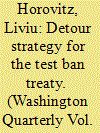| Srl | Item |
| 1 |
ID:
137245


|
|
|
|
|
| Summary/Abstract |
This article questions the predominantly pessimistic assessments over the future of the Treaty on the Non-Proliferation of Nuclear Weapons (NPT). After analysing available evidence on states’ interests and interactions within the NPT’s framework, it argues that several negative expectations are unwarranted. Conversely, the article identifies three potentially threatening scenarios. Therefore, it scrutinizes the likely impact of reactive nuclear proliferation; analyses the probability of significant actors challenging the existent nuclear architecture; and explores whether the treaty’s enforcement might soon be diluted. The article concludes the NPT is unlikely to face fundamental threats in the foreseeable future.
|
|
|
|
|
|
|
|
|
|
|
|
|
|
|
|
| 2 |
ID:
096498


|
|
|
|
|
| Publication |
2010.
|
| Summary/Abstract |
President Barack Obama has pledged to secure the ratification of the Comprehensive Nuclear-Test-Ban Treaty (CTBT), which was previously rejected by the U.S. Senate in 1999. This article attempts to predict the potential implications of Washington's ratification for the treaty's future by analyzing the positions and options of the eight other essential holdouts. The authors conclude that without the United States to hide behind, facing domestic and international constraints, and lacking substantial strategic reasons to remain outside the treaty, most holdouts will move toward ratification. Nonetheless, the process is likely to be time consuming, and several of the key actors remain unpredictable.
|
|
|
|
|
|
|
|
|
|
|
|
|
|
|
|
| 3 |
ID:
107587


|
|
|
| 4 |
ID:
109831


|
|
|
| 5 |
ID:
114935


|
|
|
|
|
| Publication |
2012.
|
| Summary/Abstract |
A scheduled conference to promote a zone free of weapons of mass destruction in the Middle East has renewed hopes for nuclear disarmament in this unstable region, if only innovative diplomacy could take advantage of the current shifts. However, a realistic assessment suggests that optimism is unwarranted. Fundamental strategic considerations related to Iran's nuclear program, Israel's atomic options, and the region's ingrate security architecture remain nearly insurmountable hurdles. Therefore, policymakers should focus first on attaining a resolution of the Israeli-Palestinian conflict.
|
|
|
|
|
|
|
|
|
|
|
|
|
|
|
|
| 6 |
ID:
175626


|
|
|
|
|
| Summary/Abstract |
This paper shows that, during 1991–1992, the George H.W. Bush Administration settled to pursue NATO enlargement in order to ensure both stability in and influence over Europe. Both were necessary subsidiary objectives towards achieving long-term security aims and the medium-term goal of furthering American prosperity. Bush officials concluded that European instability, protectionism, and self-absorption could menace US-led economic globalization. Anchoring NATO at the centre of the post-Cold War European order was seen as the best available response. NATO enlargement would alleviate European security concerns; prevent the emergence of regional security structures that endangered the Alliance; and provide the leverage Washington needed to encourage European participation in America’s global economic order.
|
|
|
|
|
|
|
|
|
|
|
|
|
|
|
|
| 7 |
ID:
127838


|
|
|
|
|
| Publication |
2014.
|
| Summary/Abstract |
This article analyses the potential motivations behind the opposition of a number of Central and Eastern European States (CESs) to the withdrawal of US deployed nonstrategic nuclear weapons (NSNWs) from Europe. It shows why CES governments obtain no military benefits from the deployed NSNW; it argues CES are unlikely to truly see them as a promising bargaining chip; it suggests CES can derive only limited prestige from US-deployed weapons and the contrasting norm of 'nuclear disarmament' likely offers a more attractive option; and it assesses potential bureaucratic interests as improbable to play a decisive role. In contrast, the article proposes a more nuanced elaboration of the transatlantic 'linkage' argument. It maintains CES have significant motives to keep the United States involved in Europe, shows how they are likely to mistrust US commitment pledges, and argues they are prone to use the NSNW debate as a convenient instrument (within a limited toolbox) towards locking in the US foothold on the continent.
|
|
|
|
|
|
|
|
|
|
|
|
|
|
|
|